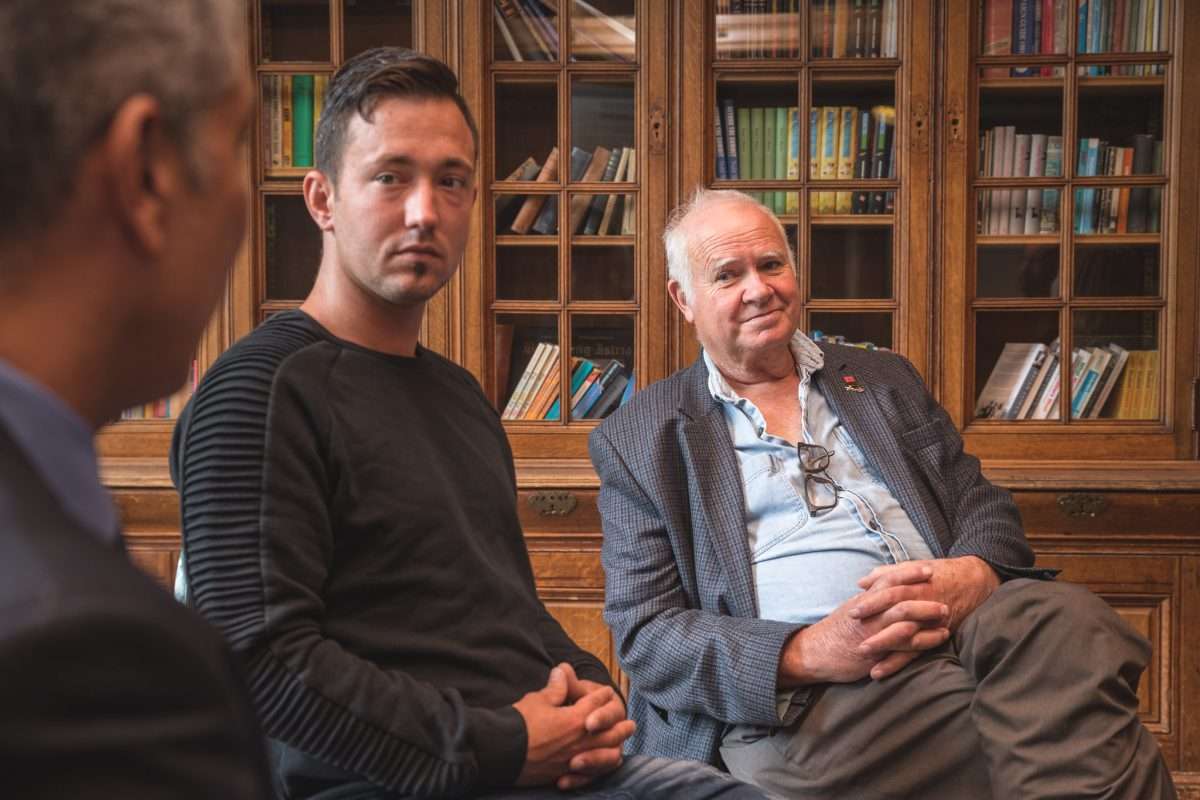
Get Help for Benzodiazepine Addiction
Table of Contents
Key Takeaways
- Benzodiazepines are drugs that can be prescribed by healthcare professionals to manage conditions like anxiety, insomnia and seizures4
- Benzodiazepines have addictive potential, so it is recommended that long-term use, beyond 2–4 weeks, should be avoided3,4
- Benzodiazepines are psychoactive drugs that affect brain functioning and slow central nervous system activity. Their use can produce unwanted side effects such as confusion, lack of coordination and memory loss4,7
- These drugs tend to be misused for their mood-boosting effects and ability to enhance the high from other illicit substances, like heroin or opioids7
- Benzodiazepines may be used as date rape drugs or in combination with other substances, like alcohol, which increases the risks of harmful side effects and overdose7,9
- Common street names for benzodiazepines include benzos, xannies and roofies
- Recreationally, benzodiazepines are taken by swallowing, snorting, smoking or injecting pill, powder or liquid forms of the drug7
- Benzodiazepines are among the most common prescription drugs involved in overdose deaths. Overdoses are medical emergencies – call 999 immediately if you are suspicious of overdose9
- Abruptly withdrawing from benzodiazepines, especially after regular or long-term use, can be dangerous and produce life-threatening withdrawal effects3,4
- Medical monitoring and a gradual reduction in benzodiazepine dose (i.e., tapering) should be carried out as part of a structured detox plan3,16
Counselling, psychotherapies and support groups can all be helpful in the treatment of benzodiazepine addiction3,13
What Are Benzodiazepines?
Benzodiazepines are prescription drugs that have sedative and anxiety-relieving properties. They are therefore used as a short-term treatment for conditions like insomnia and anxiety, in severe cases. Due to their antimuscarinic and muscle relaxant properties, these drugs are also be used in the management of muscle spasms, catatonia and seizures.1–4
Commonly used benzodiazepines include short-acting drugs, like temazepam and loprazolam, and long-acting formulations like diazepam. Short-acting benzodiazepines are considered to carry greater risks of dependence and withdrawal effects.3,4
These medications are psychoactive drugs, meaning that they impact brain functioning and cause changes in awareness, thinking, behaviours, emotions and mood. When used, they cross the blood-brain barrier and bring about depressant effects on the central nervous system.4,5
Due to their addictive potential, it is recommended that these drugs are used for short-term (i.e., 2–4 weeks) treatment only, as long-term treatment can lead to development of tolerance (where higher doses are needed to achieve desired effects) and dependence. Withdrawing from benzodiazepines following long-term treatment can also bring about withdrawal effects. These effects can be mitigated by slowly tapering the dose of the drug under medical supervision.2,3
In the UK, benzodiazepines are classified as Class C drugs. This means that it is illegal to possess, produce or supply these drugs for recreational use.6
People misuse benzodiazepines as they elevate mood and can enhance the high from other illicit substances, like heroin or opioids. When used recreationally, these drugs are typically swallowed in pill form, but they can also be snorted, smoked or injected.
Common street names for benzodiazepines include benzos, xannies, tranks, roofies and downers.
Synthetic benzodiazepines, which are manufactured in illicit labs and sold for recreational use, are considered highly addictive. These drugs are also known as novel, street or designer benzos.7
Popular Benzodiazepine Drugs
Lorazepam|Xanax| Valium
The Effects of Benzodiazepines
At prescribed doses, benzodiazepines can bring about anxiety-relieving and sleep-inducing effects, helping those suffering from anxiety disorders and insomnia. They can also have other related effects on mood and alertness, such as:7
-
Effects
- Feelings of euphoria
- Relaxation
- Relief of stress
- Dizziness
- Drowsiness
In some cases, use of benzodiazepines can lead to significant side effects, particularly if higher doses have been used. These side effects encompass an array of physical and psychological symptoms and signs.
-
Physical side effects
- Weakness
- Slurring of speech
- Tremors
- Reduced coordination
- Headache
- Vision changes
-
Psychological side effects
- Confusion
- Memory loss
- Extremely low mood
- Suicidal thoughts
In cases where benzodiazepines have been injected, the risk of life-threatening blood clots, like a deep vein thrombosis (DVT), vein damage, scarring and infections, like hepatitis or HIV, is increased.7
If you or someone you know is feeling suicidal as a result of benzodiazepine use, it is important to seek help. Helplines such as NHS 111 and Samaritans are open 24/7 to provide support to those feeling down or desperate.8
Risk Factors for Developing Addiction
The various genetic, biological and environmental factors listed below can all increase a person’s likelihood of developing benzodiazepine addiction. Not one single factor is predictive of addiction, however, in general, the more risk factors a person has, the greater their risk of developing addiction.12
-
These factors have been linked to an increased risk of benzodiazepine addiction.
- Family history of substance misuse
- Childhood trauma or abuse
- Personal history of substance misuse
- Mental health condition(s)
- Younger age (18–25 year age group)
- Female gender: Benzodiazepines are more frequently prescribed for women, as they experience a higher prevalence of anxiety disorders compared to men4
- White ethnicity
- Low socioeconomic status
- Unemployment
- Peer pressure
Doctors May Prescribe a Benzodiazepine for the Following Legitimate Medical Conditions
- Anxiety
- Insomnia
- Alcohol withdrawal
- Seizure control
- Muscle relaxation
- Inducing amnesia for uncomfortable procedures
- Given before an anaesthetic (such as before surgery)
Types of Benzodiazepines Include:
- Valium (diazepam) Valium is the brand name for the product diazepam, a long-acting benzodiazepine sometimes prescribed for acute anxiety, muscle spasms, or alcohol withdrawal symptoms. Diazepam is considered a longer-acting benzodiazepine and is slower to take effect. Valium is considered to have high potential for abuse.
- Xanax (alprazolam) Xanax is the brand name for the product alprazolam, a fast-acting benzodiazepine prescribed for acute anxiety. Xanax abuse is on the rise, particularly among young people. Despite being a Class C drug it is widely available to purchase online. Reports suggest that Xanax tablets may be laced with other dangerous and addictive drugs such as Fentanyl. Prescription drugs might seem like a safe alternative to illicit drugs because they are ‘legal’, however they can be just as addictive and deadly if taken without a prescription or abused alongside alcohol or other drugs.
- Ativan (lorazepam) Ativan is the brand name for the product lorazepam, a fast-acting benzodiazepine intended for short-term use for acute anxiety, mania, seizures, alcohol withdrawal, and several secondary medical symptoms in adults.
- Rohypnol (flunitrazepam) Also known as “roofies” or “The date rape drug,” Rohypnol is known for its sedative quality as well as producing amnesic episodes, or impaired memory while under its influence.
- Klonopin (clonazepam) Klonopin is the brand name for the product clonazepam, an anti-epileptic drug also prescribed sometimes for anxiety, involuntary movement, and panic.
- Chlordiazepoxide (librium)
- Temazepam

Download Our Brochure
Signs of Benzodiazepine Abuse
At normal or regular doses, benzodiazepines relieve anxiety and insomnia. Sometimes, people taking benzodiazepines may feel drowsy or dizzy. High doses of benzodiazepines can produce more serious side effects.
Signs of acute toxicity or overdose may include the following:
- Drowsiness/Confusion
- Dizziness, Blurred vision
- Weakness, Poor judgment, and decision making
- Slurred speech and Lack of coordination
- Difficulty breathing
- Memory loss
- Mood swings and aggressive behaviour
- Coma and even death from respiratory arrest
Signs of chronic drug misuse can include changes in appearance and behaviour that affect relationships and work performance. Warning signs in teenagers include abrupt changes in mood or sudden deterioration of school performance.
Benzodiazepines are rarely the preferred or sole drug of abuse. An estimated 80% of benzodiazepine abuse is part of polydrug misuse, most commonly used with opioids such as heroin. A two-year study by the National Institute on Drug Misuse (in the USA) found that 15% of heroin users also used benzodiazepines daily for more than one year, and 73% used benzodiazepines more often than weekly. Studies indicate that from 5% to as many as 90% of methadone users are also regular users of benzodiazepines. High-dose benzodiazepine abuse is especially prevalent in patients who are also taking methadone.
Benzodiazepines have also been used as a “date rape” drug because they can markedly impair functions that normally allow a person to resist or even want to resist sexual aggression or assault. In such cases, the drug is usually added to alcohol-containing drinks or even soft drinks in powder or liquid forms and can be hard to taste.

Benzodiazepine Health Risks
Long-term use of benzodiazepines increases the risk of dementia. Benzodiazepines cause brain damage and also put one at risk for certain types of cancer. Premature death is also a possibility from taking benzodiazepines.
Benzodiazepine addiction is more likely to occur in individuals with certain anxiety disorders, sleep disorders, and mood disorders. Oftentimes, individuals diagnosed with anxiety disorders or sleep disorders will find the effects of benzodiazepines helpful and will pursue higher and higher doses in order to increase or simply maintain the effects. This tends to lead to physical dependence, and individuals may continue seeking high doses to ward off withdrawal symptoms.
Benzodiazepine Withdrawal Symptoms
Withdrawal effects from therapeutic dosages of benzodiazepines are mainly anxiety symptoms. In addition, autonomic instability (i.e., increased heart rate and blood pressure level), insomnia, and sensory hypersensitivity are common. The most serious acute withdrawal symptoms are seizures and delirium tremens, coma, and even death.
Suddenly stopping using benzodiazepines can be dangerous. Professional help should be sought and a programme of detoxification arranged within a residential clinic such as Castle Craig Hospital.
Symptoms of Withdrawal Can Include:
- Disturbed sleep
- Nervous or tense feelings
- Being confused or depressed
- Feeling afraid or thinking other people want to hurt you
- Panicking and feeling anxious
- Feeling distant or not connected with other people or things
- Sharpened or changed senses (e.g. noises seem louder than usual)
- Shaking and convulsions
- Pain, stiffness, muscle aches, or spasms
- heavier menstrual bleeding and breast pain in women
The duration of withdrawal symptoms varies but often lasts up to six weeks and sometimes longer. Withdrawal symptoms may not start for two days after stopping the tablets and tend to be at their worst in the first week or so. Some people have had minor residual withdrawal symptoms for several months.

Compassion & Respect
Treatment for Benzodiazepine Addiction at Castle Craig
Breaking a benzodiazepine addiction can be very difficult, especially when it stems from a desire to relieve symptoms of anxiety or other mental health conditions.
Benzodiazepine rehabilitation begins with a slow detoxification process, eventually weaning a person away from the effects of the drugs while attempting to decrease the severity of the symptoms of withdrawal. As a follow-up to the detoxification program, recovering addicts are encouraged to pursue psychological therapy, group therapy, and other programs to prevent the possibility of relapse. Castle Craig Hospital has over 20 years of experience in offering such treatment for patients suffering from benzodiazepine addiction.
As a trusted partner of Castle Craig, one of the UK’s leading residential addiction treatment centres, CATCH Recovery offers a seamless continuum of care for patients transitioning from residential treatment to outpatient care. This ensures that patients receive the best possible support and care throughout their recovery journey.





-
- Votaw VR, et al. The epidemiology of benzodiazepine misuse: A systematic review. Drug and Alcohol Dependence.
- National Institute for Health and Care Excellence (NICE). Benzodiazepine and z-drug withdrawal.
- National Institute for Health and Care Excellence (NICE). Hypnotics and anxiolytics.
- Edinoff AN, et al. Benzodiazepines: Uses, Dangers, and Clinical Considerations.
- National Cancer Institute. Psychoactive substance.
- GOV.UK. Drugs penalties.
- Davis S, Sheikh Z. Benzodiazepine Abuse.
- National Health Service (NHS). Help for suicidal thoughts.
- Schmitz A. Benzodiazepine use, misuse, and abuse: A review. Ment Health Clin.
- Office for National Statistics. Deaths related to drug poisoning in England and Wales: 2021 registrations.
- Office for National Statistics. Deaths related to drug poisoning in England and Wales: 2022 registrations.
- National Institute on Drug Abuse. Drugs, Brains, and Behavior: The Science of Addiction.
- Hartney E, Gans S. DSM 5 Criteria for Substance Use Disorders: How substance use disorders are diagnosed.
- Johnson J, Westphalen D. What happens when you stop taking benzodiazepines?
- Alcohol and Drug Foundation (ADF). Withdrawal.
- Block DB, O’Keefe Osborn C. How Long Does Withdrawal From Benzodiazepines Last? Symptoms, Timeline, and Treatment.
- Cherry K, Goldman R. What Is Cognitive Behavioral Therapy (CBT)?
- Narcotics Anonymous in the United Kingdom. Welcome to UKNA.
- Scottish Government. Residential rehabilitation: literature review.
How Can Castle Craig Help?
Who will I speak to when I call Castle Craig?
When you call you will reach our Help Centre team who will give you all the information you need to help you decide whether to choose treatment at Castle Craig. If you decide that you would like to have a free screening assessment you will be asked a series of questions to build up a picture of your medical and drug use history as well as any mental health issues you are facing. If you decide you want to proceed with treatment you will be put in touch with our admissions case managers who will guide you through the admissions process.
How long is the rehab programme?
Residential rehab treatment starts at 4 weeks and can go up to 12+ weeks. Research shows us that the longer you stay in rehab and are part of the residential therapy programme, the longer the likelihood of continued abstinence and stable recovery.
How do I pay for rehab?
One concern we sometimes hear from people is how they will fund their rehab treatment. You can pay for treatment at Castle Craig privately, or through medical insurance, and some people receive funding through the NHS. The cost of rehab varies depending on what kind of accommodation you choose.
What happens at the end of my treatment?
Castle Craig thoroughly prepares patients before departure by creating a personalised continuing care plan which is formulated following discussions with the medical and therapeutic team. We offer an online aftercare programme which runs for 24 weeks after leaving treatment, in order to ensure a smooth transition back into your everyday life. Patients leaving treatment automatically join our Recovery Club where they can stay connected via our annual reunion, events, online workshops and recovery newsletters.